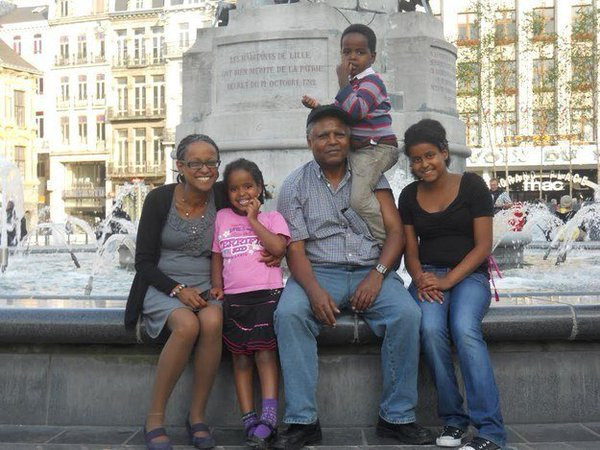Protest crackdown in Ethiopia sparks fears for fate of Ginbot 7 founder Andy Tsege
British-Ethiopian Tsege was tried in absentia and sentenced to death in 2009 for an alleged coup attempt.

A recent crackdown on anti-government protests in Ethiopia has sparked fears for the fate of prominent opposition member Andargachew 'Andy' Tsege, currently on death row in the African nation. The British-Ethiopian citizen is the founder of the Ginbot 7 political party, which Ethiopia classified as a terrorist organisation.
Tsege moved to the UK in 1979 and was granted asylum as a political refugee. In 2009, he was tried in absentia and sentenced to death by the Ethiopian government for an alleged coup attempt.
Tsege lived in London with his family until 2014, when he was arrested by Yemeni authorities in collaboration with Ethiopian intelligence at Yemen's Sana'a airport.
Some alleged his arrest was politically motivated and was part of a wider crackdown the government carried out on opposition members ahead of the 2015 general election.
Following his arrest, right groups warned Tsege was at risk of being tortured as the Ethiopian government tried to silence political opponents.
"Tsege has spent the last two years in arbitrary and illegal detention, initially at a secret location, before being taken to the notorious Kality prison. He has never had an opportunity to defend himself in court and the Kality prison authorities deny that he is in their custody," claimed the British legal charity Reprieve, which has been calling on the Ethiopian government to release Tsege.
The NGO also called on the UK government to pressure Ethiopia to free Tsege and grant him a fair trial. The charity claimed that, when previously contacted, the UK's Foreign Office "declined to ask for his release, and has instead insisted on securing 'legal access' in Ethiopia."
A Foreign Office's spokesman told IBTimes UK: "The Government has raised Mr Tsege's case with the Ethiopian Government repeatedly and at the very highest levels. We have received a commitment from Prime Minister Hailemariam that Mr Tsege will be allowed access to independent legal advice to allow him to discuss options under the Ethiopian legal system.
"We will continue to press the Ethiopian Government to ensure that Mr Tsege has access to the promised legal representation. We will also continue to provide consular support to Mr Tsege and his family," the spokesperson continued.
Ethiopia witnesses rise in anti-government protests
Reprieve's recent calls to release Tsege came as nearly 100 people were allegedly killed during anti-government protests in Ethiopia.
Demonstrations erupted in the Amhara region earlier in August, when thousands took to the streets of Gondar and Bahir Dar to protest over the administration of disputed territories. Members of the Welkait-Tegede community are demanding their lands be administered by the Amhara region, instead of the Tigray state.
Protesters, who identify themselves as ethnic Amhara people – Ethiopia's second largest group – clashed with police during the demonstrations, labelled as the biggest anti-government unrest Ethiopia has witnessed in recent history. Both witnesses and Amnesty International claimed at least 30 people were killed in Bahir Dar.
A similar scenario occurred in Oromia, where activists and witnesses claimed at least 67 people during protests. The demonstrations were the culmination of a wave of unrest that has rocked Oromia, Ethiopia's largest state, in recent months.
Who are Oromo people, Ethiopia's largest ethnic group?
Oromo people flee persecution, arrests and torture at hands of government forces
Deadly protests erupted in November 2015 against a government draft plan − later scrapped − which aimed to expand the boundaries of the capital Addis Ababa. Oromo people feared the plan would result in the confiscation of land owned by farmers, who would become impoverished as a result.
"The shooting of protesters shows that the Ethiopian government has no qualms about executing its political opponents like Andy Tsige," Maya Foa, director of Reprieve's death penalty team said in a statement. "This new round of political trials for students shows the government's scornful attitude to free speech and use of the long-arm of the law to crush dissent."
The Ethiopian embassy in London has not responded to a request for comments. The state-affiliated Fana Broadcasting Corporation (FBC) reported authorities blamed foreign enemies for the unrest and deemed the recent protests as illegal.
Commenting, Maya Foa, director of Reprieve's death penalty team, said:
"The shooting of protesters shows that the Ethiopian government has no qualms about executing its political opponents like Andy Tsige. Britain must call for Andy's release before the crackdown on pro-democracy activists goes any further. Ethiopia never gave Andy a fair hearing before sentencing him to death in absentia, and this new round of political trials for students shows the government's scornful attitude to free speech and use of the long-arm of the law to crush dissent."
© Copyright IBTimes 2025. All rights reserved.






















